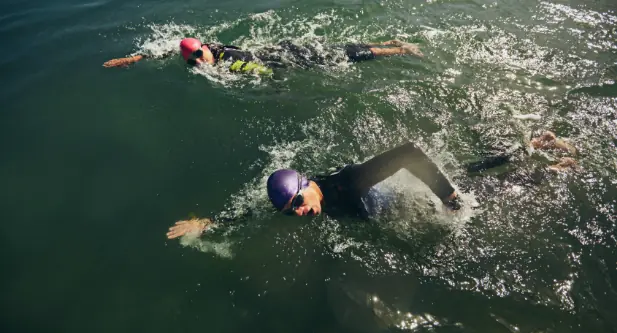
At a press conference held two days before the 1989 IRONMAN, a reporter asked the several top male contenders seated together behind a long table in a conference room at the Kona Surf Hotel what it would take to win the race. Everyone ducked the question—everyone except Dave Scott, six-time winner of the event.
"Eight ten," he said.
Scott's answered drew whistles and raised eyebrows among the journalists seated in folding chairs facing the athletes' table. After all, Scott's three-year-old course record was 8:28.
Two days later, Dave Scott went out and completed IRONMAN in 8:10—and lost to Mark Allen, who clocked an 8:09 after having gone no faster than 8:34 in six previous unsuccessful attempts to win the race.
The record-shattering duel that took place between Dave Scott and Mark Allen in the lava fields of the Kona Coast on October 14, 1989 is remembered as Iron War—the single greatest race ever run. While Allen himself and a couple of other athletes went on to slightly improve upon the rivals' times of that day, no one has ever again come close to surpassing existing beliefs about what is possible as Scott and Allen did together in their legendary showdown.
How did those two heroes of sport finish well over 20 minutes ahead of third-place finisher Greg Welch, who himself roughly matched the best that Scott and Allen had ever done previously? I spent a year searching for explanations for Scott and Allen's achievement while working on my newly published book, Iron War: Dave Scott, Mark Allen & The Greatest Race Ever Run (VeloPress, 2011). Among the answers I discovered on this journey is that Scott and Allen's "impossible" achievement was partly a case of something like—but not exactly—mind over matter.
At one point, my quest to explain Iron War brought me to Ypsilanti, Michigan, where Stephen McGregor runs the exercise science laboratory at Eastern Michigan University. McGregor's research focus is the running stride. He uses accelerometers and abstruse mathematical tools to shed light on how the strides of superior runners differ from those of lesser runners, and how the stride changes as running performance improves.
Two of McGregor's most important insights have to do with a variable called control entropy. Control entropy is a measure of the amount of variation in a runner's stride. Like snowflakes, no two strides taken by any single runner are identical. There's a tiny bit of stride-to-stride flux that the naked eye can't see but that McGregor's instruments and mathematical tools can identify. It turns out that superior runners have more entropy, or more variation, in their strides than lesser runners. This indicates that superior runners don't have to think about and mentally force their strides as much as lesser runners do.
When a runner becomes fatigued, regardless of his ability level, control entropy drops—the stride becomes "tied up" and robotic. That's because every runner, no matter how gifted and well trained, has to really concentrate on and mentally force his stride when he nears exhaustion. But the best runners are actually able to get their lowest control entropy readings lower than other runners can. This indicates that the best runners are willing and able to force themselves to continue pushing through extreme fatigue more than other runners. In other words, an extremely low control entropy reading near the point of exhaustion in a running bout indicates a high degree of mental toughness.
Could these two observations concerning control entropy in the running stride be connected? Is it possible that superior runners have more control entropy, more freedom, in their strides when fresh because they are willing and able to push hardest and achieve the lowest control entropy readings when fatigued? Stephen McGregor thinks so, and if he's right, it means that the mind is able to change the body—that the purely physical characteristic of running efficiency improves through the influence of the purely psychological characteristic of mental toughness.
There is no such thing as mind over matter. You can't jump off a building and fly simply by willing it. But mind and matter can influence each other, because they're really just two sides of the same coin. Evidence from Stephen McGregor's research on the running stride and elsewhere suggests that athletes can use the capacity of the mind to change the body to sometimes achieve performance breakthroughs that are seemingly impossible.


